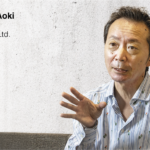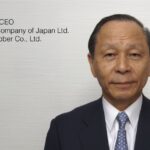GK had the pleasure of speaking with Tatsushichi Iwata, the president of Madras Inc., a purveyor of high-quality handmade leather shoes. We spoke to him about his thoughts on quality and craftmanship, as well as the growing overseas market.
How have Japanese companies been pushing the boundaries of design within the fashion industry, and how are you looking to support this shift?
In our case, we developed “meta insole®”, an innovative technology that combines stylish design with health benefits. Rather than simply following in the footsteps of overseas competitors, we aimed to create something entirely original to stand out in the market.
meta insole offers a “Shiatsu” effect on the arch with every step, contributing to strain relief and arch formation. Shiatsu, a therapeutic massage established in Japan and recognized with a national certification, is part of Eastern medicine and is spreading globally. The world-renowned shiatsu expert, Mr. Namikoshi, who continues to have VIPs worldwide, has acknowledged meta insole as the only shiatsu insoles in the world.
How is Madras contributing to a sustainable fashion world through high-quality, durable products?
Madras was established in 1921, and since then, we have dedicated ourselves to crafting high-quality shoes designed to be cherished and worn for many years. As a matter of fact, aftercare started from strong demands of passionate customers who wanted to continue wearing madras shoes as long as possible.
Many people misunderstand the nature of leather. Indeed, leather is very sustainable. Animals are not killed just for their leather, rather, it comes as a byproduct from the meat industry. Given its strong, durable nature, I would rather say leather is a sustainable material. Our 100-year history of producing high-quality leather shoes reflects our dedication to sustainable fashion. By creating footwear that is made to last and can be maintained over time, we continue to contribute to a more responsible and eco-conscious fashion industry.
Many companies in Japan are struggling with maintaining their pools of craftspeople, given the declining population and lack of skill succession to the next generation. How is Madras combating this to ensure that high-quality, handmade goods can be made within the coming decades?
This is one of the biggest hurdles for the shoemaking industry currently. However, there are many young people interested in shoemaking, which is quite surprising for my generation. At our factory in Aichi, we have started offering factory tours and workshops occasionally for those interested in art of shoemaking. To my surprise, we receive many inquires from the younger generation. I believe it is our mission to take their talents to the next level, fostering new craftmanship for the coming decades.
As the highlight of our 100th anniversary project, we also built a museum that showcases 100-year history, giving glimpse into the evolution of Madras and our dedication to quality and craftmanship. Through these initiatives we hope to inspire more people to take interest in the artistry of leather shoes as well as the craftsmanship involved in shoemaking.









